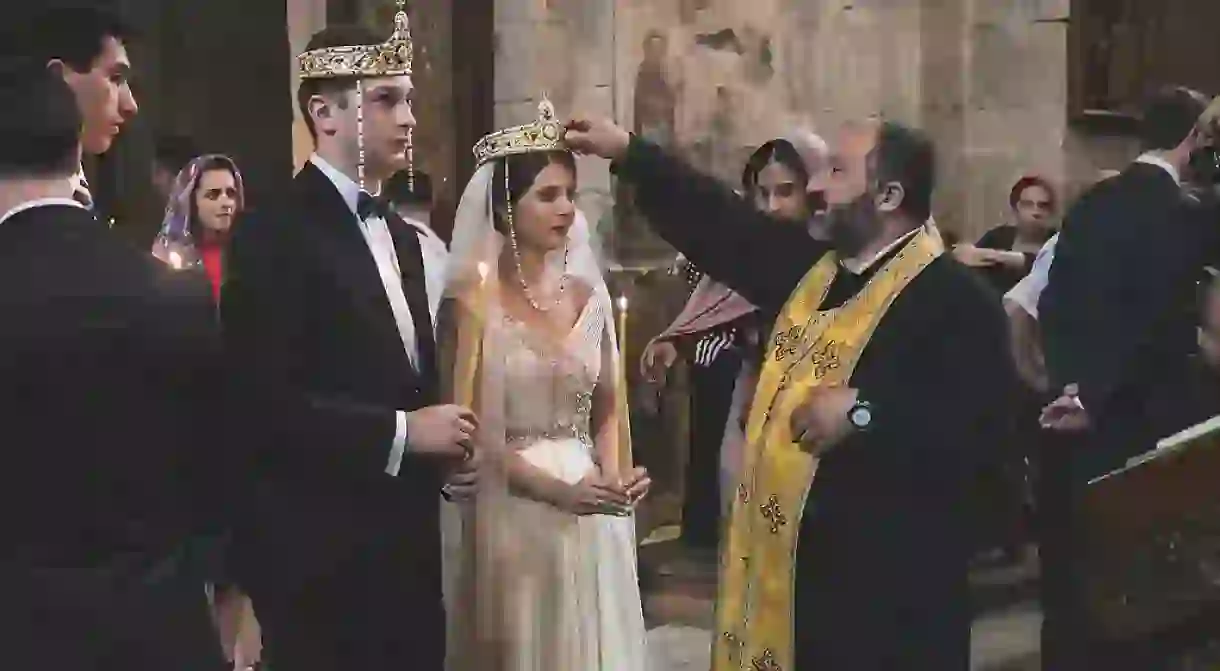What to Expect From a Georgian Wedding

Georgians love celebrating, even just small public holidays, and, thus, weddings are a big deal. Historically, wedding celebrations lasted for a couple days, but in the capital and big cities today, weddings last for a weekend. Expect tons of food, loud music, folk singing, toasts and traditional dances.
Nishnoba, the Engagement
Georgian wedding tradition starts with nishnoba, which means the engagement. In the past, the boyfriend would come to his girlfriend’s family to ask for her hand. This still happens in some parts of the country, but in Tbilisi, the nishnoba tradition has become a pre-celebration of the wedding, where the families of both sides get to know each other.
An Immense Guest List
Georgian weddings are known to be huge. On average, there are hundreds of guests invited from each side. Even distant relatives that the families don’t speak with regularly get invited. All guests are expected to attend, and declining is considered offensive unless there’s a good reason for it. So, a wedding of a 100 or 150 people is considered relatively small.

Picking up the Bride
One custom that is still very common is for the groom and his best man to pick up the bride at her house, where there is a small reception and the groomsmen are greeted by the head of the family, close friends, the bridesmaids and the bride. The guests are expected to drink a glass of wine or to cheer for the newlyweds and wish them a bright future. Afterwards, the bride, groom, best man and bridesmaids drive to the ceremony.
Lots of Walking and Driving
In Georgia, weddings consist of both a civil and religious ceremony, which are usually not one right after the other. Therefore, the couple has time to spare, so they often drive through the city together, waving their arms from the roof of a car while the makrioni (close friends and relatives) drive in a line behind them, honking their car horns and screaming to be heard for kilometres in advance. The couple might also use this time to take a photos.

A Meal in Many Courses
After the ceremonies, the bride, groom and makrioni drive to the venue where their guests greet them, and the celebration starts with a tradition—the couple breaks a plate at the threshold of the restaurant. Once everyone is seated, the toasts begin. In Georgian tradition, the head of the family chooses the tamada, the person who gives the main toast at the supra (feast). After a short introduction, the tamada toasts the newlyweds, and then others are invited to toast the couple, as well. Most often in these toasts, the bride and groom are referred as mepe and dedopali (king and queen).

The Unexpected First Dance
Georgia has a variety of traditional dances. The first dance at a traditional Georgian wedding is qartuli, or The Georgian. The dance has a romantic content, where the woman has to move gently and expose her softness, and the man has to perform several sliding motions with his feet without moving his upper body.
https://www.youtube.com/watch?v=njJBFpKJgDk
Leftovers Day
The wedding celebration will last at least until midnight, if not into the next morning. However, this is not the end of the festivities. Georgians get together the next day, usually at the groom’s family home, for a namtsetsoba, or leftovers day. Only family and friends of the newlyweds are invited, and the supra is made up of the food that is left from the previous day, hence the name.













